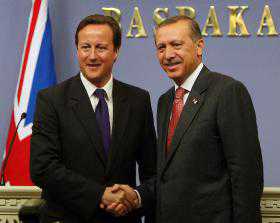The White Paper, an official UK document on investment and trade perspectives, attaches crucial importance to trade with emerging and fast-growing economies, targeting doubling economic volume with Turkey. ‘We promote trade with Turkey,’ says a contributor to the report, adding that the goals were not for the short term
The United Kingdom Trade and Investment’s, or UKTI, most recent White Paper includes a target of doubling mutual trade between the country and Turkey by 2015.
“The U.K. also has significant interests in other emerging powers,” said the report released on Wednesday.
“We aim to double trade with Turkey and support its accession to the European Union.”
Turkey is in a customs union with the EU, the document noted. “The U.K. has long been a strong supporter of Turkey’s membership of the EU, as a major emerging economy in Europe that is set to be Europe’s second largest economy by 2050. Turkey is pro-trade and is seeking a series of bilateral trade deals, with a focus on Middle East and Caucasus markets. Turkey presents a significant opportunity and the U.K. is aiming to double current trade by 2015, from a base of 9 billion pounds [$14.5 billion].”
Lord Brittan, trade adviser to the U.K. Prime Minister David Cameron, who guided the strategy set out in the White Paper, told the Anatolia news agency that the fact that Turkey is not a member of the European Union creates no obstacles in trading with the nation.
Responding to a question by Anatolia about the improvement in economic relations between the U.K. and Turkey since Prime Minister Cameron’s statement on doubling mutual trade during his visit to Ankara in July 2010, Brittan said, “This is not a short-term target.”

“We promote trade with Turkey,” he said, noting that results were dependent to the British private sector’s approach.
Still, in case results came out at a lower level than expected, the U.K. government would promote more, he said.
Brittan, a former interior minister during the Conservative Party rule under Margaret Thatcher, became Cameron’s trade consultant in August last year. He had been working at the European Commission earlier.
In the foreword section of the latest White Paper, Dr. Vince Cable, the U.K. secretary of state for business, innovation and skills, wrote that the fastest-growing emerging economies are now creating new opportunities for all to benefit further from trade and investment.
“Despite these benefits, there is an urgent need to restate the case for open markets because the insecurity that is a legacy of the economic crisis fosters a mood of protectionism,” he said. “So far, the world’s nations have largely resisted the temptation to put up trade and investment barriers. But we must remain vigilant and reinforce the global system of rules that keep markets open for us all.”
UKTI supports a number of formal ministerial bilateral economic and trade dialogues with key emerging and high growth markets, such as Brazil, China, India, Russia, Turkey and the United Arab Emirates, said the report. “These aim to strengthen economic, industrial and commercial ties between the U.K. and these markets and also look at barriers to trade between these countries.”
UKTI plans to publish its new strategy later in 2011 to set out how to enhance the practical help British exporters and investors receive from the U.K. government.
Hürriyet Daily News

Leave a Reply